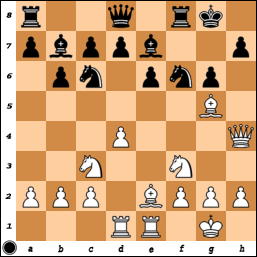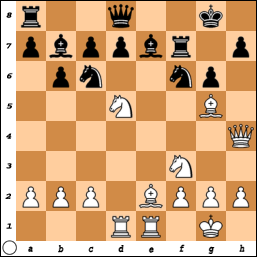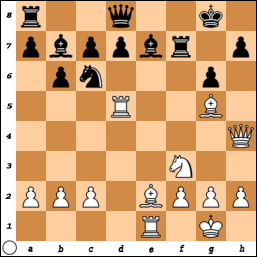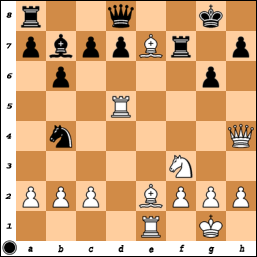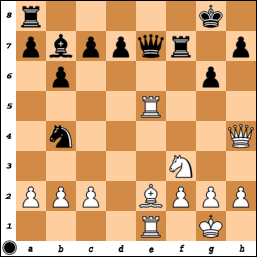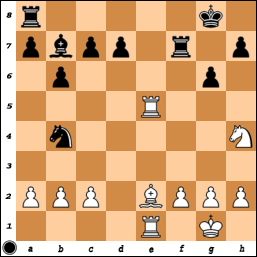You are using an out of date browser. It may not display this or other websites correctly.
You should upgrade or use an alternative browser.
You should upgrade or use an alternative browser.
Chess Match Thread
- Thread starter babe
- Start date
That's why I realized that I spoke too early, it's perfectly normal for certain amount of moves to be the same with a chess engine in the beginning of a game. Especially within a given opening it should be inevitable.I am not surprised that we would agree with a chess engine. If you are a solid player you have a good understanding of the logic of the moves, basic strategy (such as development, center control, piece strength, pins, forks, etc.), and some situations almost force moves when you have a good understanding of the game.
However except the unusual short games, after analysis of a full game(at least several games ideally and the more the better of course), if there are more than expect-able amount of moves that are same with what a modern chess engine would play, then that means there are just two possible explanations. Either the player is a very good chess player, or he/she gets help from a program. Of course, again, I'm not implying anything. It's just the fact that there is no way for a casual player to be able to play exactly the same or suspiciously similar to the modern chess engines such as Houdini, Stockfish, Rybka 3&4 or Komodo etc which are all well above 3000 elo ratings and can smoke any of the GMs of today in a match.
About the analysis part, it's a good indicator that if a player is consistently finding the best 3-4 moves throughout the game, an indicator of a very strong player/cheater, that is. Some game analyzers measure the frequency of the times that players pick those top moves. Another indicator would be the inconsistencies, like very unique and good moves in some parts of the game that betokens a comprehensive understanding of the game but some weak and unexpectedly bad moves in some other parts of the game(not to be mixed with blunders). Some chess engines can detect this inconsistencies pretty easily as well. One another indicator is the "hard to find" moves or move sequences. Chess engines will find them without a sweat, but it's nearly impossible for casual players to find them, even the great GMs would overlook them many times and they would be proud of themselves when they find them.
But at the end, you cannot tell if a player definitely cheats or not if you don't have enough gameplay data and if you don't consider the level of the player and the type of the game that is played. For instance, if Kasparov, Anand or Carlsen or some other top GMs were playing a game like we play here, their game analysis would show %99 of similarity with a 3000+ chess engine. Because they will have all the time to analyze their moves before play it which they are best at it. But If they were to play a regular lets say 2 hours of a chess game, they would play much less perfect game and differentiate in some parts of the game comparing to the chess engines that play almost perfect these days.
LogGrad98
Well-Known Member
Contributor
20-21 Award Winner
2022 Award Winner
2023 Award Winner
2024 Award Winner
1. d4 Nf6
2. Nc3 e6
3. e4 Bb4
4. e5 Nd5
5. Qg4 g6
6. Bg5 f6
7. e5xf6 Nxf6
8. Qh4 0-0
9. Nf3 Nc6
10. Be2 b6
11. 0-0 Bb7
12. Re1 Be7
Ugh hate that move, but it was basically forced. Probably should have made it earlier.
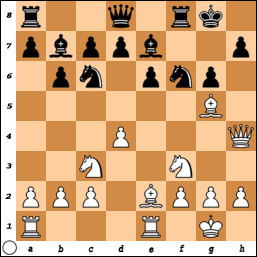
2. Nc3 e6
3. e4 Bb4
4. e5 Nd5
5. Qg4 g6
6. Bg5 f6
7. e5xf6 Nxf6
8. Qh4 0-0
9. Nf3 Nc6
10. Be2 b6
11. 0-0 Bb7
12. Re1 Be7
Ugh hate that move, but it was basically forced. Probably should have made it earlier.
Archie Moses
Well-Known Member
True story. When I was in high school, I beat the chess state champion in a game of chess. He cried.
♪alt13
Well-Known Member
LogGrad98
Well-Known Member
Contributor
20-21 Award Winner
2022 Award Winner
2023 Award Winner
2024 Award Winner
1. d4 Nf6
2. Nc3 e6
3. e4 Bb4
4. e5 Nd5
5. Qg4 g6
6. Bg5 f6
7. e5xf6 Nxf6
8. Qh4 0-0
9. Nf3 Nc6
10. Be2 b6
11. 0-0 Bb7
12. Re1 Be7
13. Ra1-d1 Rf7
14. d5 exd5
15. Ncxd5 Nxd5
16. Rxd5 Nb4
2. Nc3 e6
3. e4 Bb4
4. e5 Nd5
5. Qg4 g6
6. Bg5 f6
7. e5xf6 Nxf6
8. Qh4 0-0
9. Nf3 Nc6
10. Be2 b6
11. 0-0 Bb7
12. Re1 Be7
13. Ra1-d1 Rf7
14. d5 exd5
15. Ncxd5 Nxd5
16. Rxd5 Nb4
LogGrad98
Well-Known Member
Contributor
20-21 Award Winner
2022 Award Winner
2023 Award Winner
2024 Award Winner
1. d4 Nf6
2. Nc3 e6
3. e4 Bb4
4. e5 Nd5
5. Qg4 g6
6. Bg5 f6
7. e5xf6 Nxf6
8. Qh4 0-0
9. Nf3 Nc6
10. Be2 b6
11. 0-0 Bb7
12. Re1 Be7
13. Ra1-d1 Rf7
14. d5 exd5
15. Ncxd5 Nxd5
16. Rxd5 Nb4
17. Bxe7 Qxe7
Sorry I haven't had time to create the diagrams. Thanks for covering.
2. Nc3 e6
3. e4 Bb4
4. e5 Nd5
5. Qg4 g6
6. Bg5 f6
7. e5xf6 Nxf6
8. Qh4 0-0
9. Nf3 Nc6
10. Be2 b6
11. 0-0 Bb7
12. Re1 Be7
13. Ra1-d1 Rf7
14. d5 exd5
15. Ncxd5 Nxd5
16. Rxd5 Nb4
17. Bxe7 Qxe7
Sorry I haven't had time to create the diagrams. Thanks for covering.
AtheistPreacher
Well-Known Member
Saw this thread and thought I'd break in with a fun chess story. The story is actually my dad's, from his college days at the University of Adelaide (Australia).
Although my dad really wasn't much good at chess, he did enjoy it, so he went ahead and joined the chess team. Apparently the university was large enough and there was enough interest that they had multiple teams of five players -- I think I remember my dad saying that he was on the "E" team, or something like that -- what I'm sure about is that he said it was the very worst team.
Anyway, my dad and his fellow E-teamers show up to watch an "A-team" match between Adelaide and some other university. To their surprise, Adelaide's A-team didn't show up. So they decided to pretend to be their missing brethren and sub in for them. Figuring they had very little chance of winning any of the five games, they resolved to pit their best player against the opposing team's weakest player, etc. My dad was the very worst player on the team, and so was matched up against their top man.
Can you guess what happened?
My dad's team won five-nil.
To hear him explain it, the whole thing was a bloodbath because the opposing team didn't know what the hell was going on. They assumed my dad's team was good, and had some deep and incomprehensible strategy going. In reality, they just sucked at chess, and were simply playing for fun. But the other team's players were so disconcerted that their opponents weren't making the obvious moves that they couldn't cope with it. Adding to the effect was that my dad's team was totally calm and relaxed, smiling and feeling no pressure because they had no real skin in the game and no reasonable expectation of winning. In all five games the opposing players surrendered before the game ended, and with my dad's matchup being the most uneven one, his opponent was so befuddled that he surrendered even earlier than the rest of them.
It certainly says some interesting things about strategy and expectations...
Although my dad really wasn't much good at chess, he did enjoy it, so he went ahead and joined the chess team. Apparently the university was large enough and there was enough interest that they had multiple teams of five players -- I think I remember my dad saying that he was on the "E" team, or something like that -- what I'm sure about is that he said it was the very worst team.
Anyway, my dad and his fellow E-teamers show up to watch an "A-team" match between Adelaide and some other university. To their surprise, Adelaide's A-team didn't show up. So they decided to pretend to be their missing brethren and sub in for them. Figuring they had very little chance of winning any of the five games, they resolved to pit their best player against the opposing team's weakest player, etc. My dad was the very worst player on the team, and so was matched up against their top man.
Can you guess what happened?
My dad's team won five-nil.
To hear him explain it, the whole thing was a bloodbath because the opposing team didn't know what the hell was going on. They assumed my dad's team was good, and had some deep and incomprehensible strategy going. In reality, they just sucked at chess, and were simply playing for fun. But the other team's players were so disconcerted that their opponents weren't making the obvious moves that they couldn't cope with it. Adding to the effect was that my dad's team was totally calm and relaxed, smiling and feeling no pressure because they had no real skin in the game and no reasonable expectation of winning. In all five games the opposing players surrendered before the game ended, and with my dad's matchup being the most uneven one, his opponent was so befuddled that he surrendered even earlier than the rest of them.
It certainly says some interesting things about strategy and expectations...
LogGrad98
Well-Known Member
Contributor
20-21 Award Winner
2022 Award Winner
2023 Award Winner
2024 Award Winner
1. d4 Nf6
2. Nc3 e6
3. e4 Bb4
4. e5 Nd5
5. Qg4 g6
6. Bg5 f6
7. e5xf6 Nxf6
8. Qh4 0-0
9. Nf3 Nc6
10. Be2 b6
11. 0-0 Bb7
12. Re1 Be7
13. Ra1-d1 Rf7
14. d5 exd5
15. Ncxd5 Nxd5
16. Rxd5 Nb4
17. Bxe7 Qxe7
18. Re5 QxQ
2. Nc3 e6
3. e4 Bb4
4. e5 Nd5
5. Qg4 g6
6. Bg5 f6
7. e5xf6 Nxf6
8. Qh4 0-0
9. Nf3 Nc6
10. Be2 b6
11. 0-0 Bb7
12. Re1 Be7
13. Ra1-d1 Rf7
14. d5 exd5
15. Ncxd5 Nxd5
16. Rxd5 Nb4
17. Bxe7 Qxe7
18. Re5 QxQ

